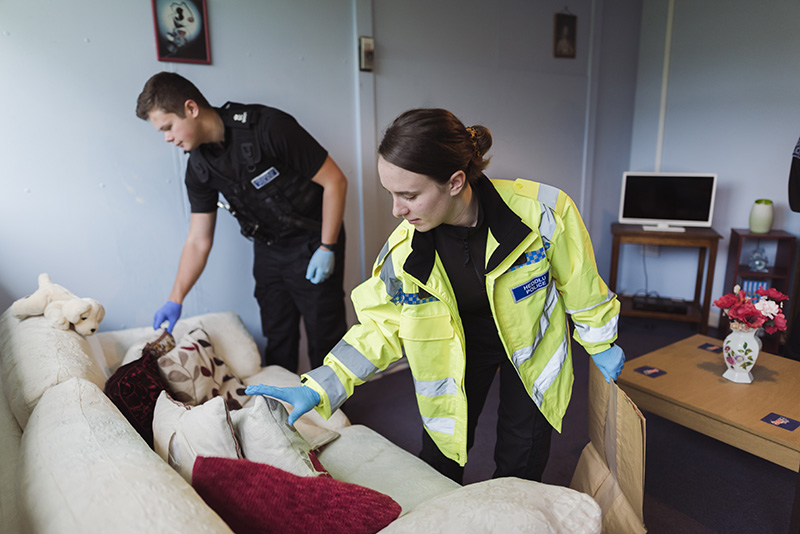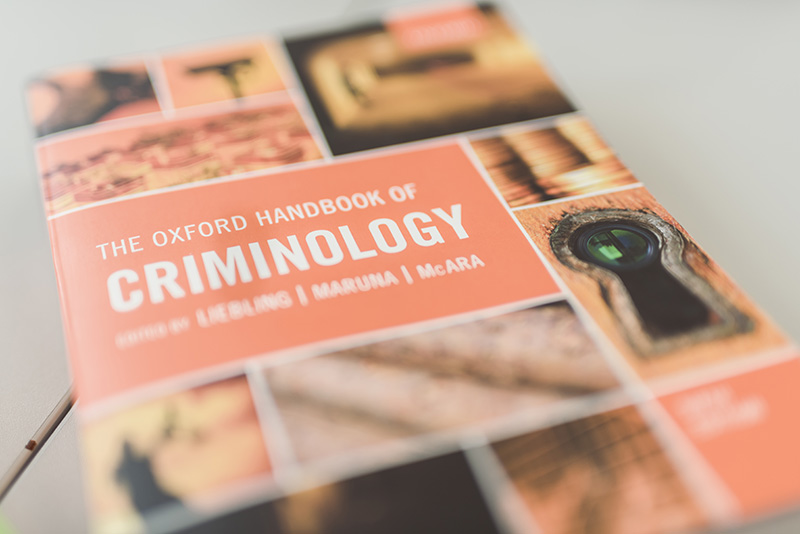BSc (Hons) Professional Policing

Course details
UCAS Code
243H
Year of entry
2024, 2025
Duration
3 YRS (FT) 4-6 YRS (PT)
UCAS Tariff
80-112
Institution Code
G53
Location
Wrexham
Course Highlights
1st in the UK
for teaching quality (Times and Sunday Times Good University Guide 2022)
1st in Wales
overall in the Criminology subject league tables (The Guardian University Guide 2022)
1st in the UK
for student satisfaction in the Sociology subject league tables (Complete University Guide 2022)
Why choose? this course?
As police forces in England and Wales aim to adapt to meet the demands of the 21st century, discover an in-depth degree developed in partnership with various police forces in the UK.
This course will:
- Combine scenario-based learning based upon simulated policing encounters, together with lectures and seminars taught by experienced academic staff and retired experienced police officers.
- Offers opportunities for students to develop their academic knowledge and skills in policing.
You will:
- Develop knowledge of the broader criminal justice system.
- Demonstrate advanced skills in dealing effectively and sensitively with members of the public.
- On completion of the course, have the necessary legal and policing knowledge and key transferable skills to meet the operational requirements of the police service.
- Study in a subject area rated first in the UK for student satisfaction in the Sociology subject league tables, Complete University Guide 2022.
- Study a course that is part of the Sociology CAH3 subject group rated 2nd out of UK universities for teaching in the National Student Survey 2021. It was also rated 1st out of Welsh universities for learning opportunities, assessment and feedback, academic support, organisation and management, learning community, student voice, students' union and overall satisfaction in the National Student Survey 2021.
- *Study a course that is part of a subject area rated 4th in the UK and 1st in Wales overall in the Criminology subject league tables, The Guardian University Guide 2022. In the same league tables, the subject area was also rated 1st in the UK for satisfaction with teaching, 1st in the UK for satisfaction with the course, and 1st in the UK for satisfaction with assessment.
- *Study a course that is rated 1st in the UK for teaching quality and 1st in Wales for student experience in the Criminology subject league tables, Times and Sunday Times Good University Guide 2022.






Policingat WGU
Watch to hear from students on our BSc (Hons) Professional Policing
Key course features
- Equips you with the knowledge and understanding, skills and tools that are highly relevant to employment as a Police Constable and in other policing roles.
- Taught by research-active academics and practitioners with a background in police and policing.
- Youwill build strong and sustainable networks and links with public service and third sector organisations involved in policing for both professional and personal development and advancement.
- An interactive blended approach to teaching.
- Proud to work with North Wales Police, Dyfed-Powys Police, West Mercia Police, Thames Valley Police and the City of London Police.
- Develops knowledge relating to the professional performance of the police constable role, permitting learners who are subsequently recruited to the police service to pursue a career as a Police Constable or Police Staff.
- Study in a subject area rated first in the UK for student satisfaction in the Sociology subject league tables, Complete University Guide 2022.
- Study a course that is part of the Sociology CAH3 subject group rated 2nd out of UK universities for teaching in the National Student Survey 2021. It was also rated 1st out of Welsh universities for learning opportunities, assessment and feedback, academic support, organisation and management, learning community, student voice, students' union and overall satisfaction in the National Student Survey 2021.
- *This course is part of a subject area rated 4th in the UK and 1st in Wales overall in the Criminology subject league tables, The Guardian University Guide 2022. In the same league tables, the subject area was also rated 1st in the UK for satisfaction with teaching, 1st in the UK for satisfaction with the course, and 1st in the UK for satisfaction with assessment.
- *This course is rated 1st in the UK for teaching quality and 1st in Wales for student experience in the Criminology subject league tables, Times and Sunday Times Good University Guide 2022.
What you will study
YEAR 1 (LEVEL 4)
MODULES
- Study Skills in Higher Education
- Understanding the Police Constable Role
- Valuing Difference and Maintaining Professional Standards
- Decision Making and Discretion
- Criminal Justice
YEAR 2 (LEVEL 5)
MODULES
- Information and Intelligence
- Evidence-Based Policing and Problem Solving
- Policing the Roads
- Digital Policing and Counter-Terrorism
- Research Methods and Skills
- Response Policing
YEAR 3 (LEVEL 6)
MODULES
- Police Investigation
- Vulnerability and Risk
- Public Protection
- Policing Contemporary Communities
- Research Project
The information listed in this section is an overview of the academic content of the programme that will take the form of either core or option modules. Modules are designated as core or option in accordance with professional body requirements and internal academic framework review, so may be subject to change.
Entry requirements & applying
Minimum entry requirements are:
- 80-112 UCAS points or equivalent e.g. Pass in an Access to Higher Education programme with 15 level 2 credits, 45 level 3 credits to be graded following the rules of a combination as follows: 6 Distinctions, 33 merits, 6 passes
- The applicant must demonstrate in their UCAS personal statement a readiness to engage in Higher Education and the motivation, in particular, to undertake a BA (Hons) Professional Policing degree.
OR
- Entry to the degree is also possible where an applicant is able to demonstrate that prior and/or experiential learning will enable them to cope with the academic and professional demands of the programme.
Subject to the availability of places, applicants meeting either of these requirements would receive an offer of an interview. At the interview, applicants’ readiness to engage in higher education and their motivation and presenting eligibility to undertake the Policing degree would be explored further.
Teaching & Assessment
Assignments are set in advance and provided to students in module handbooks and marked and returned by moodle or e-mail with students being given feedback on all assessments within an appropriate timescale determined by University regulations (currently four weeks).
Assessment criteria are published in the student programme handbook issued at the beginning of the academic year. In order to maintain an approach where students can develop their own interests and refer to their own experiences, many assignment questions can be answered from different perspectives.
The programme incorporates a range of assessments including essays, exams, presentations and role-plays.
Teaching and learning
Wrexham Glyndŵr University is committed to supporting our students to maximise their academic potential.
We offer workshops and support sessions in areas such as academic writing, effective note-making and preparing for assignments. Students can book appointments with academic skills tutors dedicated to helping deal with the practicalities of university work. Our Student Support section has more information on the help available.
In terms of particular needs, the University’s Inclusion team can provide appropriate guidance and support should any students require reasonable adjustments to be made because of a recognised prevailing disability, medical condition, or specific learning difference.
Career prospects
Our Careers and Employability Service is there to help you make decisions and plan the next steps towards a bright future. From finding work or further study to working out your interests, skills and aspirations, they can provide you with the expert information, advice and guidance you need.
The programme is specifically designed to cater for those who wish to become serving police officers. Whilst successful completion of the programme does not guarantee appointments as a Regular Constable, it enables students to make a credible application for such posts as they arise. This is because successful completion of the programme should offer standing against the training requirements set by individual forces/services during probationary periods of employment.
For those who do not want to become a Warranted police officer, but still wish to work within policing, this programme will provide a strong academic qualification to support such a career choice.
The programme will also equip students with a deep understanding of the wider criminal justice sector and open up potential career options in other criminal justice areas.
Fees & funding
You do not have to pay your tuition fees upfront.
The fees you pay and the support available will depend on a number of different factors. Full information can be found on our fees & finance pages. You will also find information about what your fees include in the fee FAQs.
All fees are subject to any changes in government policy, view our undergraduate fees.
Accommodation
If you’re looking for a place to stay while you study then take a look at our Accommodation section to get more information on your options, including our on-campus halls of residence Wrexham Village.

Take part in our annualreal-time training exercise
A high-profile Crime Scene Day learning simulation is held each year, with students from a range of courses acting out, witnessing, investigating and reporting on a high-profile crime on campus



